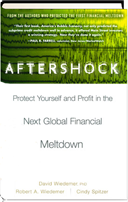Richard Russell, one of the world's most knowledgeable and respected financial advisors recently stated that fiat money is “the greatest fraud ever perpetuated on the American public.” More »
Throughout recorded history, especially in turbulent times, individuals and investors have searched for an investment that will protect them and their families, and act as... More »
The following essay, Gold and Economic Freedom” was written by Alan Greenspan, who argues strongly here in favor of a gold standard and against the concept of a central bank. More »
Texas Congressman Ron Paul delivered the following address to the United States Congress. Paul has run for President of the United States twice—in 1988 as nominee of the... More »
Excerpts-Wall Street Journal Bestselling Book: “Protect Yourself and Profit in the Next Global Financial Meltdown” More »
In all of human history, the rise of the United States, our nation’s advancement of liberty, and the unparalleled growth of our economy have certainly been among the most remarkable achievements. More »

The following excerpts are taken from the Wall Street Journal bestselling book, “Aftershock – Protect Yourself and Profit in the Next Global Financial Meltdown”. In the book, authors Robert Wiedemer, David Wiedemer, PhD, and Cindy Spitzer explain, step-by-step, how America’s Bubble Economy evolved and why and how the financial crisis that began in 2008 will inevitably lead to the collapse of the U.S. dollar. The book also spells out what investors may do to help protect themselves in these uncertain times.
In the Bubblequake of late 2008, the stock market fell dramatically and major banking institutions collapsed. In all, four big bubbles started to pop: real estate, stock, private debt, and discretionary spending.
“Next in the Aftershock, these bubbles will fall further and two more bubbles will also burst: the dollar and the U.S. government debt bubbles. With foreign investors becoming less interested in investing in the United States and ultimately moving their capital out of their U.S. assets to protect them, the value of these assets will fall and the last of our multiple bubbles will collide and fall. Our dollar will have far less buying power than it has today, stocks will fall, the real estate bubble will be hard to remember and the nation’s astronomical government debt bubble will become the equivalent of a McMansion mortgage for a family living on a McDonald’s paycheck – our government will be in default and able to borrow no more.
Interest rates will climb, as will inflation. Unemployment will rise and consumer spending will be way down, including business and consumer spending on imports. The economies of other countries, especially those heavily dependent on exports, will fall. And the world’s economy will be reeling with the pain of a temporary global mega-depression.” (Page 172)
“We call it a Bubblequake. As in an earthquake, our multi-bubble economy is starting to rumble and crack. Clearly, the real estate, credit, and stock market bubbles have already taken a serious fall, and the financial consequences for the broader U.S. and world economy have been terrible.”
Next comes the Aftershock. Just when most people think the worst is behind us, we are about to experience the cascading fall of several, co-linked, bursting bubbles that will rock our nation’s economy to the core – and send deep and destructive financial shock waves around the globe.” (Page 6)
“Based on our science-backed analysis of the evolving economy, which is neither bullish or bearish, but simply realistic, the US economy is in the middle of a long term fundamental change. It is evolving, not merely cycling back and forth between expansion and contraction. Therefore, the multi-bubble economy will not automatically turn around and go back up again in the next few years. The idea that the economy is evolving, not merely expanding and contracting and expanding again, is a key difference between us and other bearish analysts, and it is certainly a huge difference between us and the bullish experts.”
“...Our 2006 prediction of the long-term trend of falling housing and stock market prices began to emerge with a vengeance by the end of 2007 and early 2008, firmly establishing the start of the Bubblequake. And, if it were not for emergency measures by the Federal Reserve to lower interest rates in the spring of 2008, which were almost unprecedented, the stock market would have fallen much further. But, the dramatic intervention only served to temporarily blunt (not stop) the effects of the underlying fundamental trend, which is why the falling housing, private debt, and stock market bubbles are still on their way down. In time, these trends will also include a major Aftershock that few others are anticipating: the bursting of the dollar and the government debt bubbles.” (Pages 12-13)
“Once all six of our economy-supporting bubbles are fully popped, life in the post-dollar-bubble world (discussed in Chapter 10) will look quite different than the relatively quick recovery most analysts are now predicting. The vicious downward spiral of multiple popping bubbles will move the economy from the current Bubblequake to the coming Aftershock faster than the onset of the troubles we’ve already seen. And moving from the Aftershock to the post-dollar-bubble world will go quite quickly indeed. So although there is much more economic change ahead, it will increasingly happen in shorter and shorter periods of time.” (Page 33)
Gold Is a Great Bubblequake and Aftershock Investment Because It Takes Advantage of a Falling Dollar, a Falling Stock Market, and a Falling World Economy.
“As other assets values decline, people will want to put their money somewhere. They will want to buy something, preferably something of rising value that has a long tradition of acceptance and demand during difficult times. That is gold. As demand continues to rise for Gold, and then rapidly rises when the other bubbles pop, the price of gold will shoot up. The rising gold bubble is your very best bet for profits during the Bubblequake and Aftershock.” (Page 137)
